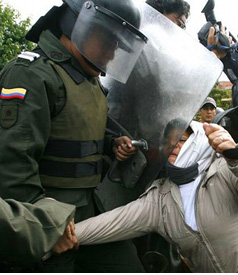
|  |  |  Americas & Beyond | March 2009 Americas & Beyond | March 2009  
Can US "Reset" Relations With Colombia?
 Robert Naiman - t r u t h o u t Robert Naiman - t r u t h o u t
go to original


| | During a demonstration against the government in Bogota, Colombia, police officers restrain a woman protestor. (John Vizcaino/Reuters) |  |
President Obama wants, quite reasonably, to "reset" relations with Russia. He also said, quite reasonably, he would "go through the federal budget line by line, programs that don't work, we cut."

US relations with Colombia also need to be reset. "Plan Colombia," which was supposedly going to cut the flow of Colombian cocaine into the US, doesn't work, either to reduce the flow of illegal drugs, or to promote human rights, democracy and the rule of law in Colombia. Since Plan Colombia doesn't work, it should be cut.

An October report from the Government Accountability Office found that coca-leaf production in Colombia had increased by 15 percent and cocaine production had increased by 4 percent between 2000 and 2006, and recommended cutting funding. Plan Colombia has cost US taxpayers over $6 billion.

Plan Colombia has also failed to promote human rights. Broadly speaking, the practical political meaning of Plan Colombia in the Colombian political context has been: "Washington supports the Colombian government, and therefore the Colombian government can do whatever it wants without restraint." The human consequences of this political blank check have been disastrous.

A recent report by Human Rights First found human rights defenders in Colombia are frequently accused by the government and its supporters of belonging to leftwing guerrillas, and are secretly investigated for months or years before being "illegally detained," Inter Press Service reports. "The steadfast investigation of spurious criminal complaints against defenders stands in stark contrast to the failure to investigate attacks, threats, and other forms of intimidation perpetrated against them or against civilians more generally," HRF said.

In Colombia, the government accusation of "supporting the guerrillas" can be a death sentence, since it's understood as a "seal of approval" for paramilitary violence. On February 20, Senators Sherrod Brown (D-Ohio) and Patty Murray (D-Washington) wrote the Colombian ambassador expressing concern at attacks made by President Uribe against human rights advocates who had testified before the House Committee on Education and Labor. Brown and Murray expressed concern for "the effect [these] comments may have on the safety of those who voluntarily testified." Uribe has publicly smeared human rights critics as members of the guerrillas' "international bloc."

Last week, the Fellowship of Reconciliation and dozens of human rights organizations and religious institutions released a letter to President Obama calling for major changes in US policy toward Colombia. The groups urged the president to end the failed drug policy and to invest in drug treatment for US citizens and aid for the millions of Colombians displaced by war. "Rather than ending the drug trade, the problem has increased - with more coca plants grown in Colombia, and cocaine as easily available in the United States," said Mark Johnson of FOR. "There is no better time than now to end Plan Colombia."

The letter urged the Obama administration to end military aid to Colombia - currently the largest recipient of US military aid in the Western Hemisphere - and called for renewed diplomatic efforts to support a negotiated settlement to the armed conflict in Colombia.

Many are looking to the Obama administration for changed policies in Latin America. Sen. Richard Lugar (R-Indiana) has called for scrapping the Cuba embargo. Reps. RaulGrijalva (D-Arizona) and Marcy Kaptur (D-Ohio) are asking the Obama administration to affirm that the US won't interfere in El Salvador's March 15 presidential election and will respect the result.

These are all worthy efforts that should be supported. But our failed Colombia policy deserves special attention: it's literally a matter of life and death. Our carte blanche support for the Colombian government has fostered a climate of impunity for violence against civilians. And all it would take to begin to make change is cutting an expensive government program that doesn't work.

Robert Naiman is senior policy analyst at Just Foreign Policy. |

 |
|  |



